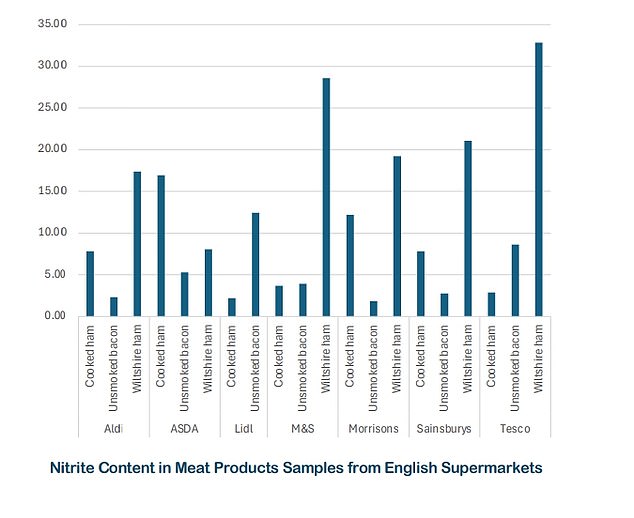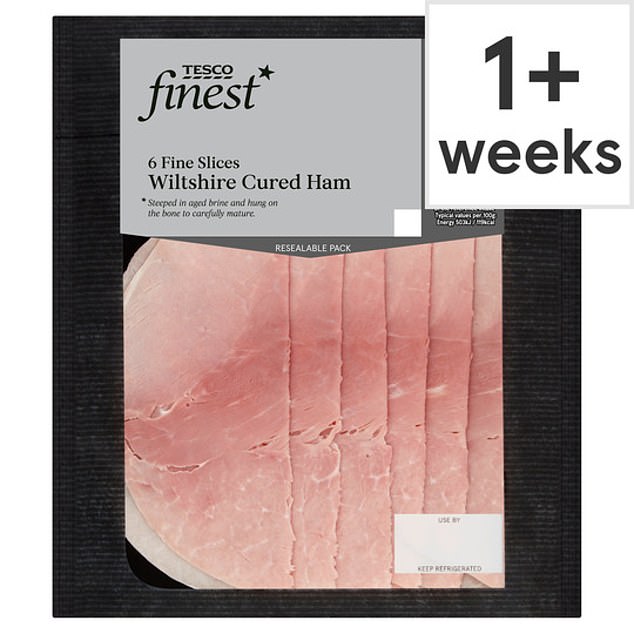A new study has revealed popular ham products sold in major supermarkets in England contain cancer causing chemicals.
These are nitrites—which are typically used to preserve meat—but have been linked to colon cancer.
They remain in meats on UK shelves almost a decade after the World Health Organization declared them unsafe in October 2015.
The 21 products researchers tested from Tesco, M&S and Morrisons all came back positive for nitrites.
The product with the highest concentration of the chemical was Tesco’s Wiltshire ham—which had almost 33 milligrams per kilogram (mg/kg).
This was considerably more than the others at 11 times the 2.88mg/kg in the store’s cooked ham and nearly four times the 8.64mg/kg in its unsmoked bacon.
Other Wiltshire ham products sold with relatively high levels included those from M&S (28.6mg/kg), Sainsbury’s (21.1mg/kg) and Morrisons (19.2mg/kg).
Meanwhile, the version sold by Asda fared better with tests revealing it only contained 8mg/kg.

A graph showing the levels of nitrates in different products sold at UK supermarkets (Image: Coalition Against Nitrites/Food Science Fusion)

The study found the product with the highest levels of the chemical was Tesco’s Wiltshire ham
A Tesco Spokesperson said: ‘We follow all UK and EU requirements, alongside guidance from the UK Food Standards Agency, to ensure we get the right balance of improving the shelf life and safety of our products with limited use of additives.
‘The nitrites levels in all of our products, including our traditionally cured Finest Wiltshire ham, fall significantly below the legal limits in the UK and EU.’
They said nitrites an ‘important part of the curing process for meats’ that are also used to prevent growth of ‘harmful bacteria that can cause serious food poisoning’.
They added that they only use nitrates ‘when necessary’ and that they are committed to clearly labelling products.
‘Customers can check product ingredient lists to see which products contain additives such as nitrites,’ they said.
The supermarket also highlighted that the reported level in Tesco Wiltshire ham is ‘significantly lower’ than the legal limit allowed in the UK and EU which is 100mg/kg.
Their findings come amid a rise in colon cancer in young people that has left many experts deeply concerned.
Latest figures suggest cases of bowel cancer in the UK are set to rise by a tenth by 2040.
The study was carried out by experts from Food Science Fusion, an accredited food testing laboratory and commissioned by the Coalition Against Nitrites.
In response to their findings, Ruth Dolby, a food scientist who led the study said: ‘We already know that regularly consuming nitrite-cured meats can harm health.
‘What makes our research important is that it highlights how Wiltshire-cured hams can contain significantly higher levels of nitrites.’
Meanwhile, Professor Chris Elliot, a food safety expert who led the independent review into the 2013 horse meat scandal, said: ‘This new analysis confirms that nitrites remain unnecessarily high in certain UK meat products.
‘Given the mounting scientific evidence of their cancer risk, we must prioritise safer alternatives and take urgent action to remove these dangerous chemicals from our diets.
‘The food industry could remove nitrites from processed meats tomorrow—as they are no longer required to make the tasty and affordable foods so many Brits love to eat.
‘Processed meat producers can take this step now and I encourage them to do so, before regulation requires them to take action.’
Professor Paolo Vineis, from Imperial College London, was a co-author of the WHO report that classified nitrite-cured processed meats as a Group One carcinogen—the same as tobacco.
He said: ‘Given the overwhelming body of scientific evidence linking processed meat to the development of colorectal cancer, it is disappointing that governments and the food industry have not yet done more to reduce the risk to human health.
‘I would personally like to see a considerable reduction in the volume of processed meat consumed, but removing nitrites from products like bacon, ham and sausages would also be a positive step in improving the health of the population.
‘As demonstrated by producers in my home country of Italy, it can be done.’
In 2022, the French health agency ANSES confirmed a link between nitrites in ham and colorectal cancer.
However, the UK Food Standards Agency still states that nitrites are ‘safe’ and ‘essential’ to produce certain processed meats.
The campaigners have called for them to change their mind and consider the many available nitrite-free alternatives.












